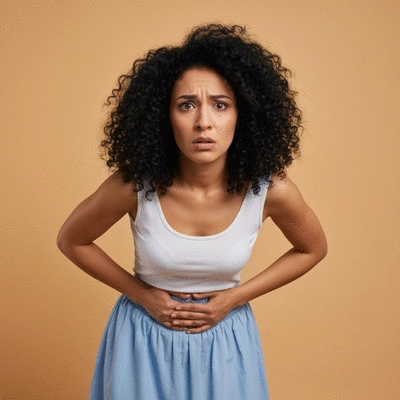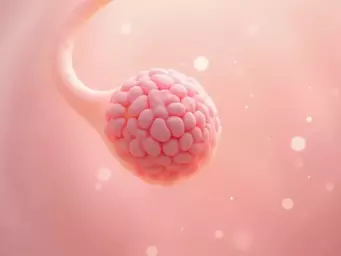Types of Ovarian Cysts
- • Functional Cysts: Most common, resolve on their own (follicular, corpus luteum).
- • Pathological Cysts: May require intervention (dermoid, endometriomas).
Posted on: 2025-10-20
By: Edyta Drabek
Have you ever felt a sharp pain during your menstrual cycle and wondered what it could mean? Ovarian cysts are more common than most women realize, and understanding them can empower you to take charge of your health. Here's what you'll learn about this often- overlooked aspect of women's health.
Ovarian cysts vary in type and symptoms, with natural approaches offering significant support through diet, herbs, and lifestyle adjustments. For a deeper dive into managing menstrual health, explore our article on managing PMS symptoms.
Understanding ovarian cysts can feel overwhelming, but I’m here to help you navigate this journey. Ovarian cysts are fluid-filled sacs that develop on or within the ovaries, and they are more common than you might think. Many women will experience them at some point in their lives, often without even realizing it. Knowing what they are and the symptoms associated with them can empower you in managing your health.
These cysts can vary in size and type, and most are harmless. However, some can cause discomfort or lead to other health issues. By staying informed, you can take proactive steps toward wellness.
Ovarian cysts are often a normal part of the menstrual cycle, mainly forming during ovulation. They typically fall into two categories: functional cysts and pathological cysts. Functional cysts are the most common and usually resolve on their own. Pathological cysts, on the other hand, may require medical intervention if they persist.
As part of my mission at Ovarian Cysts Wellness, I aim to provide you with the knowledge to recognize the types of cysts and what they may signify for your health. To learn more about common women's health concerns, check out our guide on common women's health concerns.
Recognizing the symptoms of ovarian cysts can be crucial for early detection and management. While many cysts are asymptomatic, others can cause noticeable discomfort. Here are some common symptoms to watch for:
If you experience any of these symptoms, it’s essential to monitor them and consult with a healthcare provider. Remember, you are not alone—many women face similar experiences, and understanding these symptoms is the first step towards taking control of your health.
Polycystic Ovary Syndrome (PCOS) is a hormonal disorder that often leads to the development of multiple ovarian cysts. If you have PCOS, you might experience irregular periods, weight gain, and excessive hair growth. These symptoms can impact your overall well-being.
Understanding the link between ovarian cysts and PCOS can empower you to seek appropriate treatment options. By managing your symptoms and making informed lifestyle choices, you can work towards a healthier balance.
Hormonal balance is crucial for overall wellness, and phytoestrogens play an essential role in supporting ovarian health. These natural compounds, found in certain plants, can help regulate estrogen levels in the body.
Incorporating these foods into your diet can foster hormonal balance and improve your overall health. At Ovarian Cysts Wellness, I encourage you to explore dietary changes that can support your journey towards managing ovarian cysts. Learn more about maintaining women's hormonal health through diet and lifestyle.
The following video discusses natural treatments for PCOS and ovarian cysts, which might be relevant to your blog post.Here's a brief recap of the key points discussed so far:
As we wrap up our discussion on managing ovarian cyst discomfort, it's essential to recognize that natural solutions can significantly enhance your well-being. At Ovarian Cysts Wellness, I aim to empower you with effective strategies that embrace both herbal remedies and lifestyle choices. By integrating these practices into your daily routine, you can create a holistic approach that supports your overall health.
First, let’s explore some key herbs and lifestyle adjustments that can promote comfort and balance. Here are a few valuable solutions to consider:
These natural solutions not only target symptoms but also help to foster a deeper understanding of your body’s needs. Remember, every woman’s journey with ovarian cysts is unique, and finding the right balance is key to your wellness.
Integrating herbs and lifestyle choices into your routine can feel like a personal journey towards empowerment. You may find simple adjustments to your daily practices can lead to significant improvements in your comfort levels. For instance, dedicating time each day to sip on herbal teas not only provides hydration but can also offer soothing relief from discomfort.
Consider creating a cozy routine where you enjoy these teas while reflecting on your wellness journey. This practice not only nurtures your body but can also be a moment of mindfulness in your busy day!
Nutritional supplements play a crucial role in supporting women's health, especially when it comes to managing ovarian cysts. Certain vitamins and minerals can help balance hormones and alleviate symptoms. Here’s a list of supplements you might consider:
Adding these supplements to your diet can enhance your body’s ability to cope with ovarian cyst symptoms. If you’re unsure where to start, consider reaching out to a healthcare provider for personalized recommendations.
While natural approaches can offer significant relief, it’s essential to remember that seeking professional guidance is a crucial part of your journey. Understanding your body and its unique needs can lead to tailored treatments that address your specific situation.
Every woman’s experience with ovarian cysts is different, and what works for one person may not work for another. Listening to your body and understanding its signals is vital. I encourage you to seek help from healthcare professionals who can provide personalized care.
By combining natural remedies with medical advice, you can create a comprehensive plan that supports your health. Don't hesitate to share your experiences and concerns with your healthcare provider; after all, they are there to support you!
Empowering yourself with knowledge is one of the most effective ways to manage ovarian cyst discomfort. At Ovarian Cysts Wellness, I believe that understanding your condition and exploring natural solutions can lead to a more balanced and fulfilling life. Remember, this journey is yours, and taking small steps today can lead to significant changes tomorrow.
Stay informed, listen to your body, and don’t hesitate to reach out for support when you need it. We’re all in this together, and I’m here to help you along the way!
Here is a quick recap of the important points discussed in the article:
A: Ovarian cysts are fluid-filled sacs that develop on or within the ovaries. They are very common and often form during the menstrual cycle, particularly during ovulation.
A: No, most ovarian cysts are harmless and resolve on their own without medical intervention. These are known as functional cysts. However, some pathological cysts may require medical attention due to discomfort or other health issues.
A: While many cysts are asymptomatic, common symptoms can include pelvic pain (which may radiate to the lower back or thighs), bloating, a feeling of fullness or heaviness in the abdomen, and changes in menstrual cycles.
A: PCOS is a hormonal disorder that often leads to the development of multiple small ovarian cysts. It is also associated with irregular periods, hormonal imbalances (like elevated androgen levels), weight gain, excessive hair growth, and insulin resistance.
A: Yes, incorporating certain foods, especially those rich in phytoestrogens, can help support hormonal balance. Examples include soy products, flaxseeds, and legumes. A diet focused on whole foods and avoiding processed items is generally beneficial.
A: Natural remedies include herbal teas like chamomile, ginger, peppermint, and green tea for their anti-inflammatory and soothing properties. Dietary adjustments, stress management techniques (such as yoga and meditation), and heat therapy (warm compresses) can also provide relief.
A: It's essential to consult a healthcare provider if you experience persistent or severe symptoms, changes in your menstrual cycle, or any concerns about ovarian cysts. Professional guidance ensures proper diagnosis and tailored treatment plans for your specific needs.



 Understanding ovarian cysts can feel overwhelming, especially if you're navigating discomfort on you
Understanding ovarian cysts can feel overwhelming, especially if you're navigating discomfort on you
 Building your personalized self-care kit can be a transformative experience, especially during chall
Building your personalized self-care kit can be a transformative experience, especially during chall
 Many women are unaware that ovarian cysts are a common issue, with many experiencing them at some po
Many women are unaware that ovarian cysts are a common issue, with many experiencing them at some po